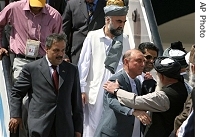2007年VOA标准英语-Afghan, Pakistani Figures Gather for Peace Conf
搜索关注在线英语听力室公众号:tingroom,领取免费英语资料大礼包。
(单词翻译)
By Benjamin SandIslamabad
08 August 2007
Pakistan and Afghanistan are preparing for a landmark2 peace conference, or grand jirga. The four-day talks open against a backdrop of growing regional violence and worsening cross-border relations. From the Afghan capital Kabul, VOA Correspondent Benjamin Sand reports.

Ali Mohammad Jan Orakzai head of the Pakistani delegation1, right second, greets with Afghan officials at the Kabul international airport in Kabul, Afghanistan, on Wednesday, 8 Aug. 2007
The talks encountered a major setback3 when Pakistan President Pervez Musharraf reportedly backed out of a plan to help inaugurate the jirga Thursday.
Hundreds of delegates from both countries began gathering4 in the dusty Afghan capital Wednesday. The jirga comes amid a surge in militant5 violence.
Afghanistan's six-year Taleban insurgency6 is bloodier7 than ever. More than six-thousand people have been killed in the past 18 months.
Pakistan has been rocked by a wave of suicide attacks that have left nearly 300 people dead in recent weeks. Both sides blame the other for the region's growing insecurity and cross border ties are at an historic low.
Here in Kabul, as in Islamabad, few people expect the jirga to produce any diplomatic breakthroughs. But Afghanistan's national security advisor8, Zalmai Rasoul says he remains9 optimistic the meeting will be worthwhile.
"We from the Afghan side, we are putting a lot of hope that this jirga will give the starting point of an understanding between the Afghan people and the Pakistani people that the war on terror cannot be won if all of us do not work together," Rasoul said.
U.S. officials say they hope the jirga will ease tensions and improve security between the two countries, both key allies in the U.S.-led war against terrorism. The plan to hold this jirga was conceived in Washington last year.
More than 700 delegates will attend, including local politicians, religious leaders and tribal10 elders.
But security experts say some of the most influential11 actors will not be participating. The local Taleban was not invited and many of their tribal supporters from Pakistan say they will boycott12 the meeting.
In Islamabad Tuesday, Pakistan Interior Ministry13 spokesman Brigadier Javed Iqbal Cheema urged the tribal representatives to reconsider their decision.
"There is still time and I hope they would join the jirga. I think its time that we have to rise above our personal interests, above our political interests," Cheema said.
Pakistan Prime Minister Shaukat Aziz is now expected to join Afghan President Hamid Karzai, in place of President Musharraf on Thursday.
U.S. and Afghan authorities have accused Islamabad of ignoring Taleban bases in Pakistan's volatile14 tribal areas. Pakistan denies those charges and recently stepped up military operations targeting suspected Taleban camps.
 收听单词发音
收听单词发音 




